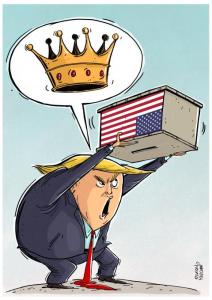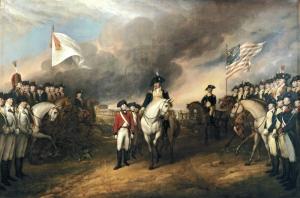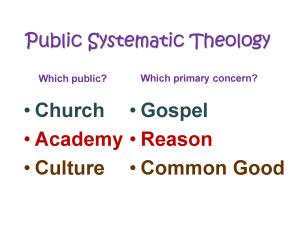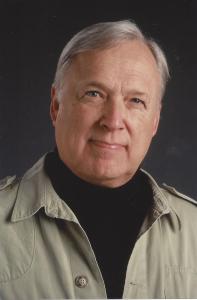Will the Trump Tyranny fall?
Will a more compassionate America emerge?
PT 3212.

Are we watching the fall of the Trump Tyranny? That is a good question. Should we take bold action to make it happen? That’s another good question.
Here is a more important question: does America want to define itself as a nation of compassion? If we want a more compassionate America, then preventing a resurgence of the Trump Tyranny will be required.
Our new heroine is Liz Cheney. Like the courageous Saint George going out to fight the dragon, Wyoming Congresswoman Liz Cheney walks right into the flames thrown by the tyrannous Trump. Not with swords loud clashing! But with deeds of love and mercy. And, most decisively, justice. That’s how the kingdom of God comes. That is also how a compassionate America comes.
Voices and bugles are sounding. Patheos challenges us: “Taking Freedom for Granted or To Heart this 4th of July?” Erich Schneidewind, President of AARP, issues a clarion call. “Help Make America Compassionate Again!”
The January 6 Congressional Hearings

The Congressional Hearings on the January 6, 2021 assault against the 2020 election results have been revelatory. The evidence is now out. Then president Donald Trump purveyed a “big lie” that the election had been stolen. He claimed falsely that Joe Biden did not become the legitimate president of the United States. Furthermore, Donald Trump instigated an insurrection type of assault on the Capitol in order to overturn the election results. Why? To remain in power.
The assault on the Capitol was only a symptom of the national cancer. This particular person, Donald Trump, is so intoxicated with power that he has no regard for protocol, no regard for the peaceful transition of power, no regard for the rule of law. Trump’s unassailable megalomania is like a California forest fire on a windy October day. It sweeps erratically over the landscape without regard to the welfare of those caught in its path of destruction. Another term as president could result in a scorched earth.
Callousness Versus Compassion

What defines such a callous personality is that the nation must serve Donald Trump along with those oligarchs who make a profit from his tyranny. Rather than the president serving the nation, the nation feeds the insatiable appetite of the president for applause, obeisance, and glory.
This stands in sharp contrast to a constitutional America, according to which the government rules by consent of the governed. This stands in sharp contrast to a compassionate America, where the governed concede great power to the president so that the president can pursue the common good of the nation and even the world.
A more compassionate America
I vote for a more compassionate America. Will such a vote count?
Striving to become a more compassionate America belongs to this nation’s covenant. What do I mean?
In a previous article, “Covenant, Blood, and Violence: America at War with Itself and Others,” I argued that there are two fundamental symbols or models—covenant and blood–for America’s self-understanding.
Covenant Versus Blood: Covenant
First, covenant. In the 17th century, the Puritans relied on connecting American destiny and God’s covenant with ancient Israel. God, thought the Puritans, was making a new covenant with America. If Americans would pursue righteousness and justice, God would bless America. If Americans would pursue carnal selfishness and economic greed, God would judge America with wrath. “We must entertain each other in brotherly affection,” admonished John Winthrop when elaborating on the common good. “We must be willing to abridge ourselves of our superfluities, for the supply of others’ necessities” (cited in Gorski, 2017,37). In the name of the common good, the rich should share with the poor.
Covenant symbology draws the line between good and evil right through America’s heart (Bellah, 1975). The idea of covenant permits us Americans to examine ourselves, confess our sins, repent, reconcile, and resolve to pursue the common good once again.
Non-Christians may not identify with a covenant between America and the God of Israel. Non-Christians must still decide, however, whether or not they want a more compassionate America.
Covenant Versus Blood: Blood
Second, blood. In the 18th century, the American revolutionaries were ready and willing to shed the Crown’s blood. With the American Revolution of 1776, to covenant symbology was added conquest. Although the earlier covenant idea never abated, it was supplemented with manifest destiny, exceptionalism, and expansionism. As “the dark side of civil religion, according to Yale’s Philip Gorski, Religious Nationalism became “a red-hued canvas in heavy oils, filled with the blood and fire of war and apocalypse, and replete with battle scenes in which the forces of good and evil square off on land, on sea, and in the air…justice and peace can be achieved only through violence and bloodshed” (Gorski 2017, 35,34).

The blood symbols remain biblical. Yet, they draw the line between good and evil not through America’s heart but between America and its enemies. Here is what is theologically significant: whereas for the covenant symbol God’s judgment is rendered against America, for the blood symbol God’s judgment is rendered against America’s enemies.
It is clear: a more compassionate America would rely more on covenant symbolism and less on blood symbolism.
Regardless of the historic symbology, the non-Christian right along with the Christian will have to decide whether to pursue compassion or tyranny.
Public Theology: Toward a More Compassionate America
 This post is an exercise in public theology.[1] Public theology, I contend, is conceived in the church, critically reasoned in the academy, and offered to the wider culture for the sake of the global common good.[2]
This post is an exercise in public theology.[1] Public theology, I contend, is conceived in the church, critically reasoned in the academy, and offered to the wider culture for the sake of the global common good.[2]
At this moment of national decision-making, the public theologian should take a stand. I recommend a stand on behalf of a more compassionate America. This will require a firm renunciation of the Trump Tyranny.[3]
Yes, of course, the moral status of both Donald Trump and Liz Cheney is ambiguous. Neither is a devil or a saint. There is no pure goodness or pure evil here. Nevertheless, within that ambiguity, it is imperative that we take a stand. Without fervent commitment, no redemptive action is possible.
Covenant symbology inspires and guides us to deliberate, decide, and take action on behalf of a more compassionate America.
This post is PT 3212. A More Compassionate America? Trump Tyranny
▓

Ted Peters is a Lutheran pastor and emeritus seminary professor. He is author of Short Prayers and The Cosmic Self. His one volume systematic theology is now in its 3rd edition, God—The World’s Future (Fortress 2015). His book, God in Cosmic History, traces the rise of the Axial religions 2500 years ago. He has undertaken a thorough examination of the sin-and-grace dialectic in two works, Sin: Radical Evil in Soul and Society (Eerdmans 1994) and Sin Boldly! (Fortress 2015). Watch for his forthcoming, The Voice of Christian Public Theology (ATF 2022). See his website: TedsTimelyTake.com.
Ted Peters’ fictional series of espionage thrillers features Leona Foxx, a hybrid woman who is both a spy and a parish pastor.
▓
[1] Public theology, I say often, is conceived in the church, critically refined in the academy, and offered to the wider culture for the sake of the global common good. This is how I carry on the legacy of my University of Chicago mentor, David Tracy, for whom: “Theology is distinctive among the disciplines for speaking to and from three distinct publics: academy, church, and the general culture” (Tracy, The Role of Theology in Public Life: Some Reflections 1984, 230).[2] “In a nutshell, public theology (theologia publica) is concerned with the public affairs or institutions of society (res publica) to promote the common good of society.” (Chung 2022, 11).
[3] According to Katie Day and Sebastian Kim, “Public Theology is thus theologically informed public discourse about public issues, addressed to the church, synagogue, mosque, temple or other religious body, as well as the larger public or publics, argued in ways that can be evaluated and judged by publicly available warrants and criteria” (Day 2017, 4).
References
Bellah, Robert. 1975. The Broken Covenant: American Civil Religion in Time of Trial. New York: Seabury.
Chung, Paul. 2022. Public Theology and Civil Society: Constructive Formation. Madris: EBL.
Day, Katie, and Sebastian Kim. 2017. “Introduction.” A Companion to Public Theology. Eds, Katie Day and Sebastian Kim. Leiden: Brill. 1-21.
Gorski, Philip. 2017. American Covenant: A History of Civil Religion from the Puritans to the Present. Princeton NJ: Princeton University Press.
Peters, Ted. 2018. “Public Theology: Its Pastoral, Apologetic, Scientific, Politial, and Prophetic Tasks.” International Journal of Public Theology 12:2 153-177; https://brill.com/abstract/journals/ijpt/12/1/ijpt.12.issue-1.xml.
Tracy, David. 1984. “The Role of Theology in Public Life: Some Reflections.” Word and World 4:3: 230-239.













